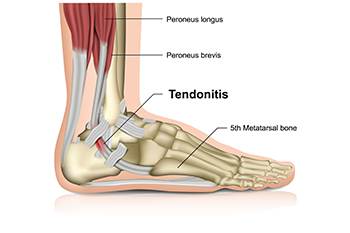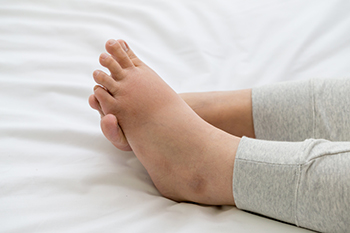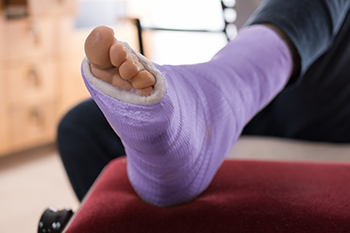Items filtered by date: June 2023
How Is an Achilles Tendon Injury Diagnosed?

An Achilles tendon rupture is a common injury. It can happen from falling or increasing mileage and distance too quickly while running. Many people hear a disturbing sound, such as popping or cracking, at the time of the injury, and it can be accompanied by extreme pain. Prompt medical attention is often sought for relief, and an X-ray can be performed to rule out a fracture. This can lead to having the Thompson test performed, which is done by squeezing the calf. This is successful in determining the plantarflexion at the foot and ankle. A positive test may conclude that an Achilles tendon injury has occurred. Effective treatment methods can consist of frequently elevating and resting the foot, and a supportive boot may be worn for stability as the healing process occurs. If you have endured an Achilles tendon injury, it is strongly suggested that you are under the care of a podiatrist who can help you to manage this condition.
Achilles tendon injuries need immediate attention to avoid future complications. If you have any concerns, contact Henrietta Obidigbo, DPM of Jersey Foot and Ankle Clinic. Our doctor can provide the care you need to keep you pain-free and on your feet.
What Is the Achilles Tendon?
The Achilles tendon is a tendon that connects the lower leg muscles and calf to the heel of the foot. It is the strongest tendon in the human body and is essential for making movement possible. Because this tendon is such an integral part of the body, any injuries to it can create immense difficulties and should immediately be presented to a doctor.
What Are the Symptoms of an Achilles Tendon Injury?
There are various types of injuries that can affect the Achilles tendon. The two most common injuries are Achilles tendinitis and ruptures of the tendon.
Achilles Tendinitis Symptoms
- Inflammation
- Dull to severe pain
- Increased blood flow to the tendon
- Thickening of the tendon
Rupture Symptoms
- Extreme pain and swelling in the foot
- Total immobility
Treatment and Prevention
Achilles tendon injuries are diagnosed by a thorough physical evaluation, which can include an MRI. Treatment involves rest, physical therapy, and in some cases, surgery. However, various preventative measures can be taken to avoid these injuries, such as:
- Thorough stretching of the tendon before and after exercise
- Strengthening exercises like calf raises, squats, leg curls, leg extensions, leg raises, lunges, and leg presses
If you have any questions please feel free to contact our office located in Freehold, NJ . We offer the newest diagnostic tools and technology to treat your foot and ankle needs.
See Your Podiatrist Regularly If You Work On Your Feet
Pregnancy Can Produce Swollen Feet

Pregnant women often notice how swollen their feet become during this time in their lives. This happens for various reasons. The body naturally produces more blood that can help the fetus to grow. Additionally, the uterus puts pressure on the veins that return blood from the legs, and swollen feet may result. Pregnancy hormones can also have an effect on the veins, and the blood may pool in the ankles and feet. Swollen feet often begin during the second trimester, and can last for the duration of the pregnancy. Effective prevention methods for swollen feet can include frequently elevating the feet, drinking plenty of water daily, and engaging in a simple exercise routine. Some women find it helpful to wear compression stockings, and this may help to manage existing swelling. If your feet and ankles are unusually swollen and uncomfortable during your pregnancy, it is suggested that you visit a podiatrist who can offer you additional relief methods.
Pregnant women with swollen feet can be treated with a variety of different methods that are readily available. For more information about other cures for swollen feet during pregnancy, consult with Henrietta Obidigbo, DPM from Jersey Foot and Ankle Clinic. Our doctor will attend to all of your foot and ankle needs.
What Foot Problems Can Arise During Pregnancy?
One problem that can occur is overpronation, which occurs when the arch of the foot flattens and tends to roll inward. This can cause pain and discomfort in your heels while you’re walking or even just standing up, trying to support your baby.
Another problem is edema, or swelling in the extremities. This often affects the feet during pregnancy but tends to occur in the later stages.
How Can I Keep My Feet Healthy During Pregnancy?
- Wearing orthotics can provide extra support for the feet and help distribute weight evenly
- Minimize the amount of time spent walking barefoot
- Wear shoes with good arch support
- Wear shoes that allow for good circulation to the feet
- Elevate feet if you experience swelling
- Massage your feet
- Get regular, light exercise, such as walking, to promote blood circulation to the feet
If you have any questions please feel free to contact our office located in Freehold, NJ . We offer the newest diagnostic and treatment technologies for all your foot and ankle needs.
Various Types of Bunion Surgery

A bunion is a bony lump that forms on the side of the big toe. It can become larger, and cause the other toes to move toward each other. Patients who have bunions and find difficulty in completing daily activities may choose to have bunion surgery performed. A bunion can be caused by genetic reasons, or from frequently wearing shoes that are too tight. Foot surgery may be considered, which may be successful in removing the bunion. This is referred to as a bunionectomy, and can be chosen if pain relief is not obtained from nonsurgical methods. After local anesthesia is administered, the podiatrist can determine which type of bunion surgery is best for you. When the joint in the big toe is cut and realigned, this is referred to as an osteotomy. An exostectomy is defined as surgery that removes the bunion and the toe is not aligned. When the deformity is corrected by using metal places or screws, this type of bunion surgery is known as an arthrodesis. If you have a bunion, and are considering surgery, it is strongly suggested that you are under the care of a podiatrist who can determine which type of foot surgery is correct for you.
Foot surgery is sometimes necessary to treat a foot ailment. To learn more, contact Henrietta Obidigbo, DPM of Jersey Foot and Ankle Clinic. Our doctor will assist you with all of your foot and ankle needs.
When Is Surgery Necessary?
Foot and ankle surgery is generally reserved for cases in which less invasive, conservative procedures have failed to alleviate the problem. Some of the cases in which surgery may be necessary include:
- Removing foot deformities like bunions and bone spurs
- Severe arthritis that has caused bone issues
- Cosmetic reconstruction
What Types of Surgery Are There?
The type of surgery you receive will depend on the nature of the problem you have. Some of the possible surgeries include:
- Bunionectomy for painful bunions
- Surgical fusion for realignment of bones
- Neuropathy decompression surgery to treat nerve damage
Benefits of Surgery
Although surgery is usually a last resort, it can provide more complete pain relief compared to non-surgical methods and may allow you to finally resume full activity.
Surgical techniques have also become increasingly sophisticated. Techniques like endoscopic surgery allow for smaller incisions and faster recovery times.
If you have any questions please feel free to contact our office located in Freehold, NJ . We offer the newest diagnostic and treatment technologies for all your foot and ankle needs.
Foot and Ankle Stress Fractures

Bones in the feet and ankles are common areas for stress fractures. A stress fracture happens from repeated pressure on a bone. It is this repeated stress that differentiates a stress fracture from a typical broken bone. Runners and dancers are prone to stress fractures of the feet and ankles, especially after an increase in the level of activity. Certain other groups, such as those with osteoporosis, those with abnormalities of the foot structure or biomechanics, and those on certain medications, can have an elevated risk for stress fractures as well. A stress fracture can cause pain that is heightened with weight bearing or when direct pressure is applied to the affected bone. After such an injury, it is important to decrease weight-bearing activities to prevent a more unstable fracture from occurring. Diagnosis of a stress fracture can be difficult because it does not always show up on an X-ray. A CT scan or MRI is more sensitive to picking up these types of fractures. If you feel you might have sustained a stress fracture to your foot or ankle, it is suggested that you see a podiatrist for a proper diagnosis and treatment.
Stress fractures occur when there is a tiny crack within a bone. To learn more, contact Henrietta Obidigbo, DPM from Jersey Foot and Ankle Clinic. Our doctor can provide the care you need to keep you pain free and on your feet.
How Are They Caused?
Stress fractures are the result of repetitive force being placed on the bone. Since the lower leg and feet often carry most of the body’s weight, stress fractures are likely to occur in these areas. If you rush into a new exercise, you are more likely to develop a stress fracture since you are starting too much, too soon. Pain resulting from stress fractures may go unnoticed at first, however it may start to worsen over time.
Risk Factors
- Gender – They are more commonly found in women compared to men.
- Foot Problems – People with unusual arches in their feet are more likely to develop stress fractures.
- Certain Sports – Dancers, gymnasts, tennis players, runners, and basketball players are more likely to develop stress fractures.
- Lack of Nutrients – A lack of vitamin D and calcium may weaken the bones and make you more prone to stress fractures
- Weak Bones – Osteoporosis can weaken the bones therefore resulting in stress fractures
Stress fractures do not always heal properly, so it is important that you seek help from a podiatrist if you suspect you may have one. Ignoring your stress fracture may cause it to worsen, and you may develop chronic pain as well as additional fractures.
If you have any questions, please feel free to contact our office located in Freehold, NJ . We offer the newest diagnostic and treatment technologies for all your foot care needs.





